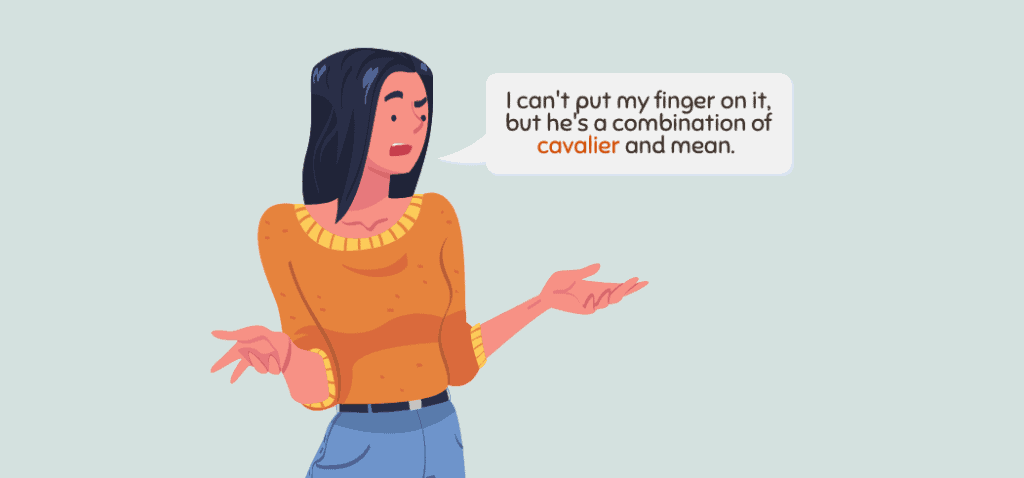In the sprawling English language, few words possess as much swagger and panache as cavalier. This nifty term manages to encapsulate an entire persona within its three syllables, and it’s got a backstory that’s as dramatic as the attitude it describes. So, let’s take a look at its true meaning and see how it fits within a full sentence.
What Does Cavalier Mean?

Cavalier, at first, sounds like the name of a flashy sports car, doesn’t it? Actually, it’s not a fancy car, but it is the name of one Chevrolet model, but that’s beside the point here. Other than the name of a car, the term itself is mostly used as an adjective for someone who has a nonchalant, careless or even slightly arrogant attitude.
But it can also be used in noun form to mean horseman or someone mounted and riding a horse.
What Is a Cavalier Attitude?
A cavalier attitude is the art of not giving a fig—but with style rather than just being an idiot. It’s the ability to shrug off concerns with almost arrogant ease, often leaving a trail of raised eyebrows in its wake. If worries were bullets, a person with a cavalier attitude would be the Matrix, dodging them with a grin that makes you want to slap them.
Picture a roguish character in a movie, sauntering into a room without a care in the world. Almost every TV show, movie and book has a character like this. Off the bat, I’m thinking of Hook from Once Upon a Time or Dean Winchester from Supernatural.
Etymology and Origin of Cavalier
The noun came before the adjective and dated back to the early 1500s when it derived from the Italian cavaliere, which meant mounted soldier or knight. The adjective form came about during the 1650s in Elizabethan English to describe men who were gallant and knightly or had a certain swagger to them.
Synonyms for Cavalier
Want to add some spice to your linguistic repertoire? Here are a few synonyms that capture the cavalier spirit.
- Nonchalant
- Disdainful
- Carefree
- Insouciant
- Jaunty
Using Cavalier in a Sentence

Here are some examples of how to infuse your everyday conversations with a dose of cavalier charm.
- Danny approached his many impending deadlines with a cavalier attitude, as if time bent to his will.
- I can’t put my finger on it, but he’s a combination of cavalier and mean.
- Janice made the choice to become a full-time author with such a cavalier approach, as if giving up her career as a teacher meant nothing.
- Despite the gravity of the situation, the president maintained a cavalier demeanor, like a cat watching a laser pointer.
- The murderer’s cavalier attitude in the courtroom left everyone flabbergasted, and it only took one day for the jury to find him guilty.
It’s All Attitude
That should tell you all the important details about the word cavalier. Remember that it can be both a noun and an adjective, but it’s mostly an adjective nowadays. Add this term to your vocabulary, and then check out my other helpful grammar guides!
